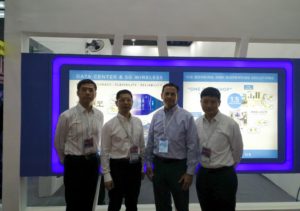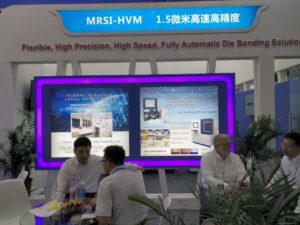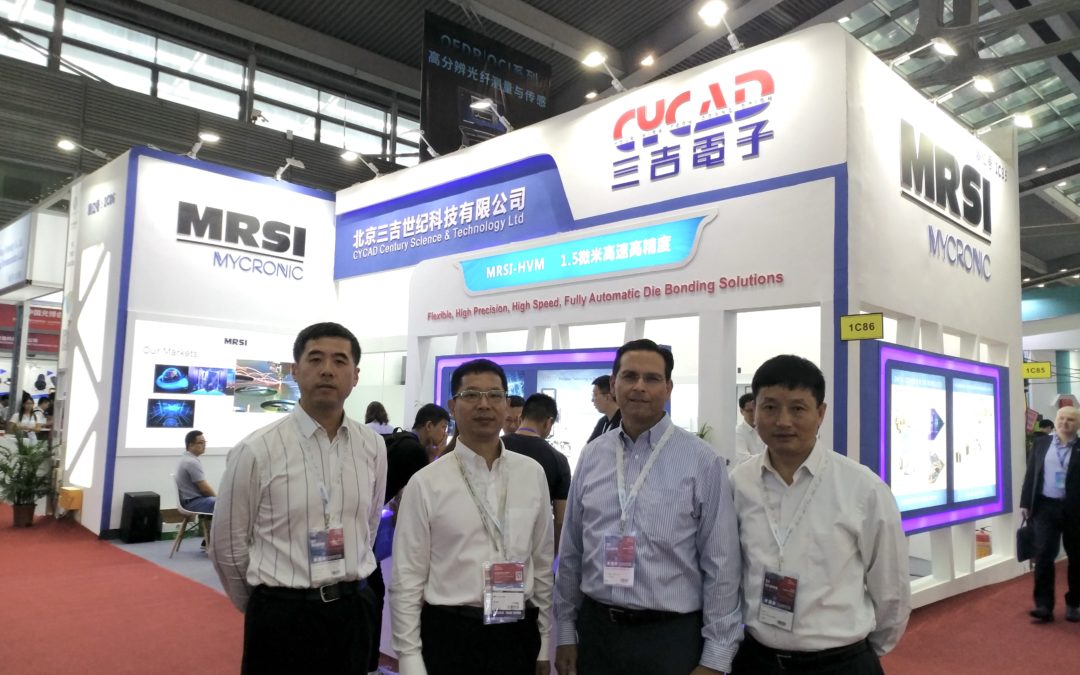Dr. Qian, Vice President of Marketing, MRSI Systems (Far Right)
The 21st China International Optoelectronic Expo (CIOE) was held at the Shenzhen Convention and Exhibition Center from September 4-7th, 2019. As the world leader in optoelectronic device automation packaging, MRSI Systems (Mycronic Group) co-exhibited with CYCAD Century Science and Technology and highlighted the MRSI-H and MRSI-HVM, with other products and latest technologies.
5G licenses were officially issued by the Chinese Ministry of Industry and Information Technology during the first half of 2019. China Mobile, China Telecom, China Unicom, and China Radio and Television Network Co., Ltd. received licenses. China has officially entered the 5G commercial year.
New Products Introduced
MRSI exhibited its die bonding and dispensing process solutions for microwave and RF, microelectronics, optoelectronics, and sensors. The main focus was on MRSI-H and MRSI-HVM, a series of 1.5 micron (at 3 sigma) high-speed, high-precision, ultra-flexible die bonding machines. An inline MRSI-HVM was displayed, with a conveyor and automatic loader/unloader.

Continuous Technology Innovation
MRSI has long been recognized as an industry standard, providing solutions to the world’s leading optoelectronic and microelectronics customers. MRSI was founded with the concept that quality comes first. After more than 30 years of developing strong technical capabilities and excellent field service, MRSI has created the strongest team of research, engineering, applications and services in the field of die bonding manufacturing. MRSI maintains industry-leading precision and flexibility while sustaining the world’s leading speed in high-precision die bonding machines.

MRSI achieves superior performance in its product series through its many advantages, which include: dual head, dual eutectic station, “zero-time” tool changing system configuration, ultra-fast eutectic temperature ramp-up/down, and multi-level, multi-function parallel process automation.
Dedication to Customers
In April 2019, MRSI Systems established the MRSI Demo Center at Mycronic China, located in the Luchuang Yungu Building, Nanshan District, Shenzhen, China. MRSI can better serve the Chinese market by providing the optoelectronics industry in the region with direct access to and more understanding of MRSI equipment. Live demonstrations are being offered for users to understand the packaging process capabilities of MRSI’s flexible, efficient and high-precision die bonding equipment. In the first half of 2019 alone, MRSI has already achieved impressive results. The demand for the two high-speed production series of MRSI-H and MRSI-HVM is rapidly growing. MRSI is currently expanding its production capacity to meet these rising demands and integrating supply chain with Mycronic to further improve equipment delivery and global service.
Keeping up with Market Trends
With the evolution of 40/100/200/400/800G technology, 100G modules have been widely adopted in the construction of data centers. At OFC 2019, experts predicted the 400G module will achieve one million shipments between 2021-2022, with a strong growth projection thereafter. The biggest challenge for 400G data centers is packing more components and high-speed chips into 100G size packages. 400G optical modules with higher density and higher speed require higher precision in packaging equipment. Mass production equipment using 1.5 microns will support more chips integrated into the same module, creating smaller gaps for high-speed bonding.

The arrival of 5G brings tremendous opportunities to the entire communication industry and its ecosystems. As a leader in 5G technology, China’s investment in 5G is significant – which has allowed China to develop its industry quickly. Operators in China have now entered the 5G pre-commercial stage.
With this year being the first in terms of 5G, MRSI Systems introduced the new 1.5 micron MRSI-H-TO, a high-speed die bonding machine designed specifically to meet the needs of new TO devices. This equipment is used for manufacturing advanced photonics devices for 5G wireless networks, such as DFB/WDM/EML-TO cans used in SFP28+ transceiver products. Features include TO pick-and-place process, double-head motion system, and it also uses a “zero-time” tips changer, which enables maximum throughput with multi-chip, multi-process flow on a single machine.
For 5G base station RF power amplifier devices and phased array antennas, higher accuracy is required to achieve co-planarity of large chips and consistent die bonding among chip arrays in high-volume mass production environment. The 1.5 micron MRSI-H-LD introduced by MRSI Systems provides an excellent solution for these requirements. MRSI has become the preferred supplier of die bonding equipment for 5G microwave and RF devices.

Chinese Version originally published by fiber.ofweek.com

